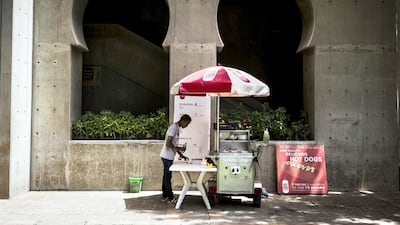Khaled Abdel Ghaffar, a graduate of the American University in Cairo’s economics department, got a crazy business idea on visits to California and Beirut – to sell American hot dogs in the streets of Cairo off a hygienic, state-of-the-art cart. As with many thousands of other Egyptians with their own business plans, the question was where to get the money to put his plan into action.
Mr Abdel Ghaffar, 24, took all of his own savings, about 70,000 Egyptian pounds (Dh33,700), and ordered a $3,500 cart with a gas-powered refrigerator from the US.
He spent weeks in Alexandria to get it out of customs, then went to get a licence from the Cairo governorate. After three months of chasing and misinformation, he was told he could not get a licence because such street carts were illegal. Between shipping costs, a 40 per cent customs duty and bureaucracy, he was soon out of money.
This is where business incubators, a type of financing new to Egypt, come into play.
First developed in the US more than a half century ago, incubators are a concept that needs encouraging. In the past few years, perhaps a dozen in various shapes have appeared on the Egyptian scene, including Flat6Labs, Delta Inspire, Start-up Egypt, Tamkeen, Endeavour Egypt, Intilaaqah Egypt and the government-run Ayady.
Foreign donors, including the British and American governments and the European Bank for Reconstruction and Development, have been getting in on the action as well.
Mr Abdel Ghaffar eventually found a spot for his beef-in-a-bun cart, downtown inside the former Greek campus of the American University of Cairo, which is now run by Ahmed Al Alfi, an Egyptian investor who has devoted himself to helping start-ups get off the ground.
Still, Mr Abdel Ghaffar had not solved his financing problem and was running at a loss, so he borrowed another 20,000 pounds from his brother and set up another cart in the Smart Village just outside Cairo.
He had considered going to a bank. There are some that do lend to micro-enterprises. A pioneer was the state-owned Banque du Caire. In 2000 the government had brought in management from the private sector to run the bloated and overstaffed bank, and one of the first things they did was to move 800 of its 10,500 employees to a new micro-lending unit.
Micro-lending normally makes little sense for banks, but for Banque du Caire the staff were already on the payroll and had small salaries. Other state-owned banks followed with programmes of their own.
But banks demand collateral, and they tend to want three years of financials. All Mr Abdel Ghaffar had was his cart. He preferred the start-up model, where entrepreneurs give equity in new companies in exchange for finance as opposed to taking on debt.
He turned first to Flat6Labs, which Mr Al Alfi founded in 2011. In exchange for a 15 per cent stake in new ventures it provides entrepreneurs with 100,000 Egyptian pounds, along with technical and administrative coaching.
Flat6Labs focuses mainly on technology start-ups, but Mr Abdel Ghaffar’s idea impressed them and he was accepted into the programme. They sent him for a week-long seminar. But the programme was suddenly suspended partway through, leaving him and several other start-ups rushing to find alternative financing.
Mr Abdel Ghaffar then thought of crowdsourcing. There are a number of new platforms in the region, and he submitted a proposal to Cairo Angels, which started in early 2012. It helps arrange 250,000 to 1 million pounds in funding for start-ups from a network of investors. Sadly, his idea was not accepted.
Finally he turned to another incubator, Delta Inspire.
Run by the Harvard-educated businesswoman Neveen El Tahri, Delta Inspire in September set up a fund in the form of a company called 138 Pyramids. It is prepared to invest as much as 1 million pounds in exchange for a 20 per cent stake, and gives mentoring, networking, auditing, legal expertise and branding advice. Later, it helps companies arrange finance through traditional loans.
Since September, 138 Pyramids has studied 60 proposals, chosen about eight as having potential and got two up and running. These include that of Mr Abdel Ghaffar, who signed an agreement in February and two weeks ago finished establishing his enterprise, the Hot Dog Stand, as a holding company. He got 180,000 pounds to help him.
For the investor, the start-up model is management-intensive. Once you provide finance you have to visit your entrepreneurs to make sure they have not simply taken your money and ran away.
There is no shortage of business ideas in Egypt. As an investment, venture capital in general does not provide high returns. But the ventures that do make it often do so spectacularly. Setting up the financing infrastructure is best spearheaded by the private sector and not the government.
Civil servants tend to have little understanding of the risks of the investment world.
“It’s being created,” says Ms El Tahri. “The market is huge, huge, huge, and so underserviced.”
Patrick Werr has worked as a financial writer in Egypt for 25 years for agencies including Reuters and Bloomberg News.
Follow The National's Business section on Twitter

